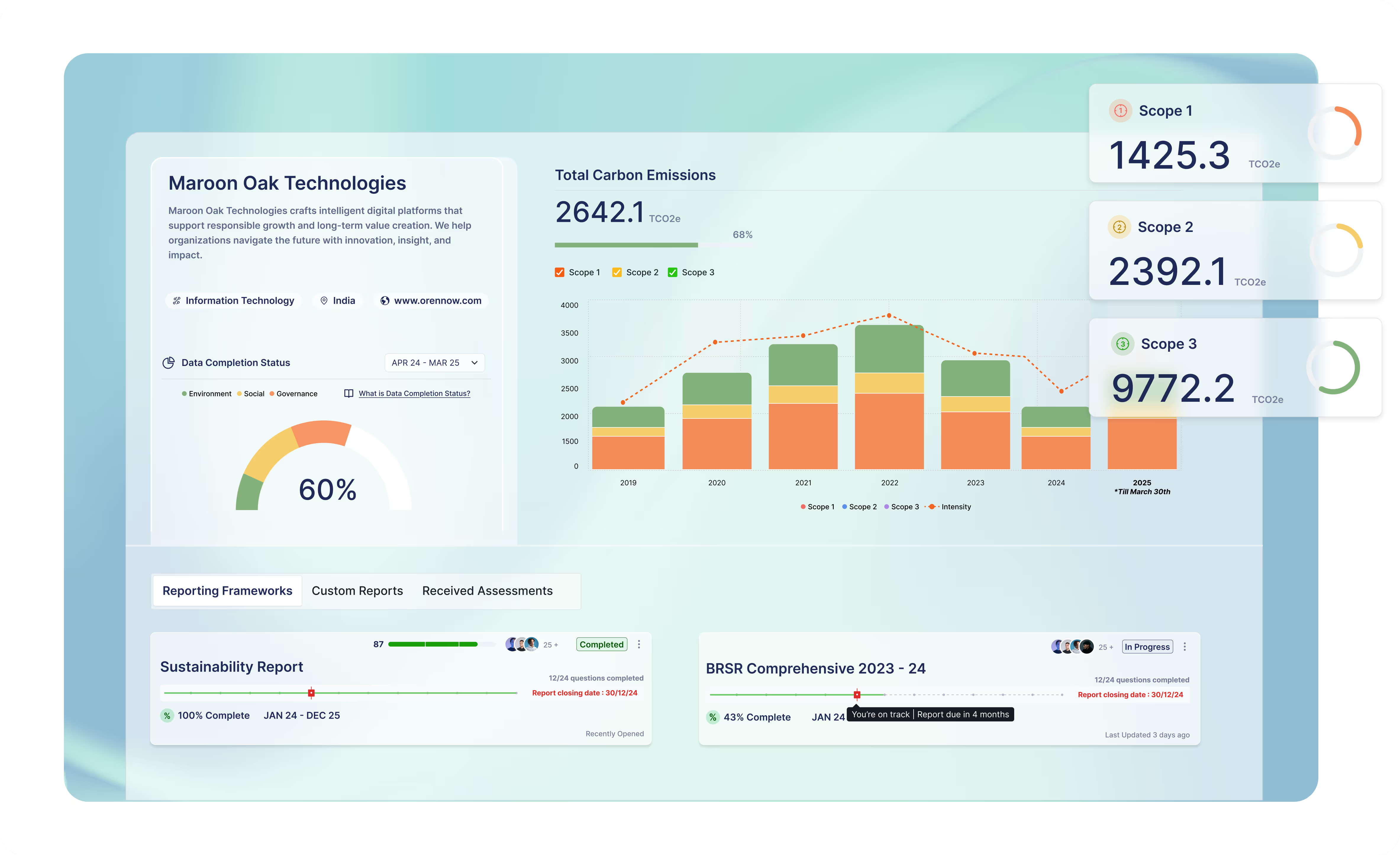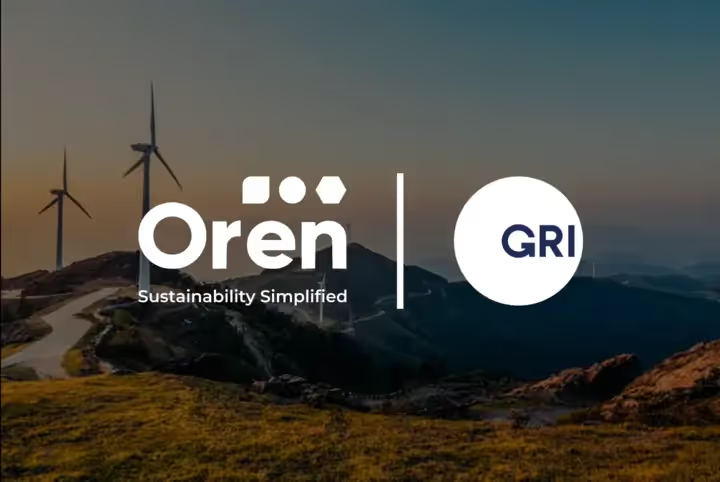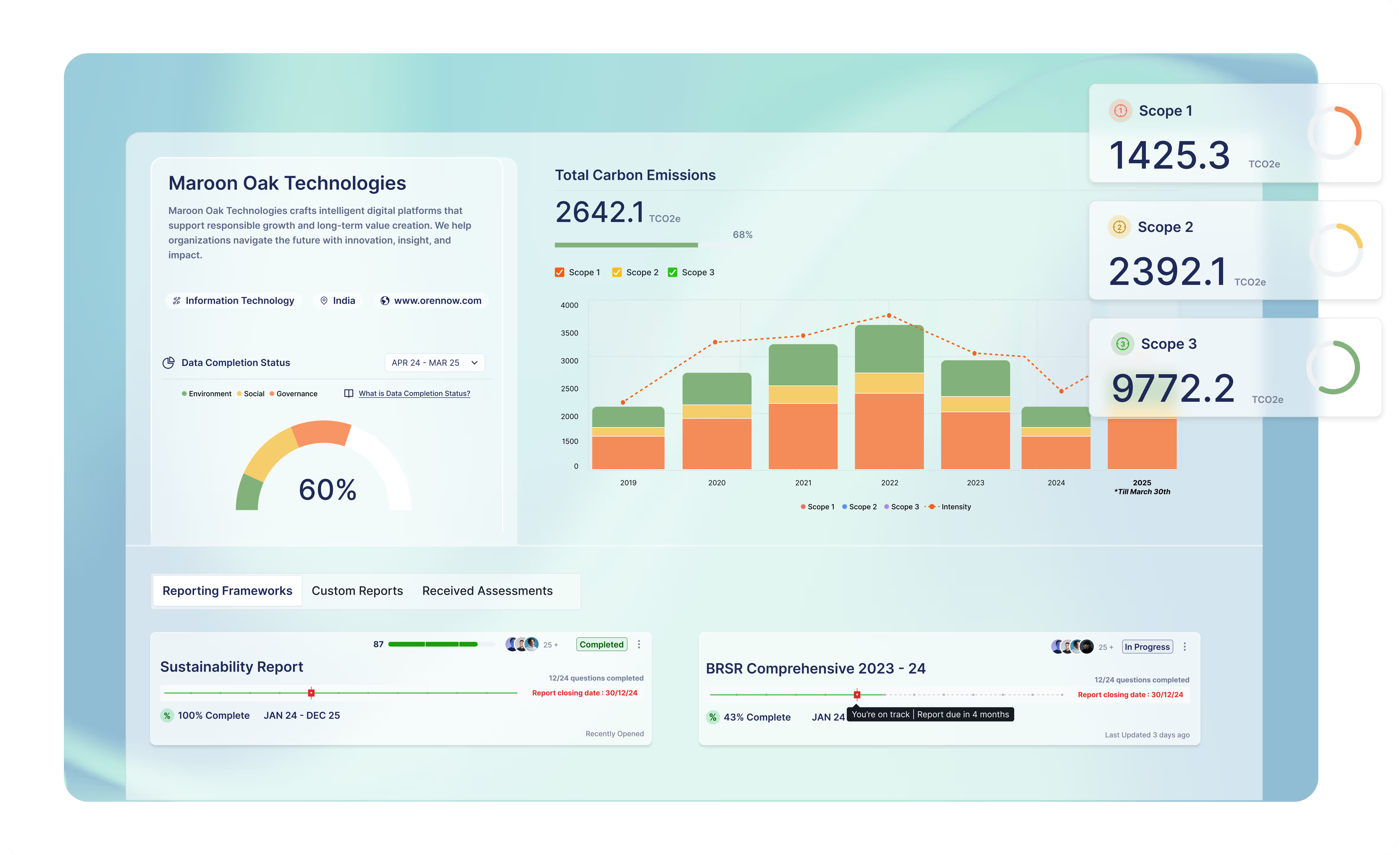What is GRI (Global Reporting Initiative)
The Global Reporting Initiative (GRI) is an independent, international organisation that provides the world's most widely used framework for sustainability reporting. The simple purpose is to help organisations measure, manage, and communicate their economic, environmental, and social impacts, all in a clear way.
There is a set of modular, interrelated GRI standards. These are there to enable organisations to disclose information that matters most to their stakeholders. They are designed to:
- Check the quality of information
- Encourage better transparency and accountability
Some GRI Facts
| Fact | Details |
|---|
| Founded | 1997 (in Boston, USA) (later established as a nonprofit in Amsterdam in 2002) |
| Headquarters | Amsterdam (Netherlands) |
| Standards | Modular structure with Universal, Sector, and Topic Standards |
| Global Reach | 14,000+ organisations have adopted it across 100+ countries |
| Industries | Corporates, governments, NGOs, and financial institutions |
Defining Characteristics of the Global Reporting Initiative
The Global Reporting Initiative sets the benchmark in sustainability reporting. The framework it has is built on standardisation. This gives organisations a consistent way to prepare GRI reports that align with international best practices. The reporting becomes structured and easier to understand for stakeholders.
At Oren, we ensure your GRI reports go beyond compliance. Our focus on transparency and accuracy means stakeholders can easily interpret and trust your sustainability data. The common standards help companies to disclose ESG performance. So, investors, regulators, and other stakeholders easily compare progress across industries and regions. Better trust and decision-making happen.
Stakeholder inclusivity is another valuable GRI aspect. Reports are designed to capture issues that matter most to people and communities impacted by a company's activities.
Goals and Purpose of the GRI
Organisations are able to disclose their impacts responsibly and use that information to drive long-term value through GRI. The main purposes include:
- Fostering accountability: Allows companies to acknowledge their effects on the environment, society, and economy.
- Improving clarity: Establishes a straightforward framework for developing GRI reports that stakeholders can readily access and comprehend.
- Directing sustainable choices: Assists organisations in leveraging ESG data to develop strategies and establish quantifiable objectives.
- Enhancing stakeholder confidence: Ensures that reports address the concerns most pertinent to investors, regulators, employees, and communities.
- Promoting enduring value: Frames sustainability not merely as adherence to regulations, but as a catalyst for growth and strength.
Significance of GRI
Organisations get a trusted framework to put across their sustainability performance clearly. They enjoy renewed trust by showing accountability to stakeholders, from investors and regulators to customers and communities. It improves ESG disclosures. It makes them more transparent and auditable. Hence, better decision-making. Businesses stay prepared for evolving compliance requirements with enough credibility and a competitive edge in the global market.
Importance of GRI
- Transparency and accountability
- Assurance-readiness
- Stakeholder communication
- Competitive advantage
Who Can Benefit from Using GRI?
| Who Benefits | How They Benefit |
|---|
| Multinational Corporations | Showcase global sustainability performance with consistency and credibility. |
| Small & Medium Enterprises | Gain recognition, meet stakeholder expectations, and improve reporting practices. |
| Government Bodies | Ensure transparency, accountability, and alignment with international standards. |
| NGOs | Build trust, demonstrate impact, and strengthen stakeholder engagement. |
| Industry Groups | Benchmark performance and align with global best practices. |
Important Aspects and Priorities of GRI in ESG
The GRI focuses on the three main pillars of ESG to ensure accurate, credible, and transparent reporting:
Environmental Impact
Covers topics like climate change, energy use, emissions, biodiversity, and resource management. GRI helps organisations disclose how their operations affect the environment and what steps are taken to reduce risks.
Social Responsibility
Includes human rights, labor practices, community engagement, and product responsibility. Through GRI reporting, companies can demonstrate accountability and positive contributions to society.
Governance Practices
Focuses on ethics, compliance, anti-corruption measures, and decision-making processes. Strong governance reporting builds trust with investors, regulators, and stakeholders.
Together, these aspects ensure that GRI reports reflect what matters most for long-term sustainability and stakeholder confidence.
How the GRI Framework Operates
- Select relevant Standards – Organisations begin with the Universal Standards (GRI 1, GRI 2, GRI 3), then choose applicable Sector and Topic Standards based on material topics.
- Conduct materiality assessment and stakeholder engagement – Identify and prioritize the sustainability issues that matter most to the organisation and its stakeholders.
- Gather and compile disclosures – Collect impact data using a structured GRI reporting tool and craft the report in line with selected standards and reporting principles.
- Publish and register – Publish the sustainability report and optionally register it with GRI to signal alignment.
Core Principles for Reporting Under GRI Standards
The GRI Standards rely on quality principles that ensure sustainability reporting is both credible and useful:
- Accuracy: Report information that's factually correct, with clear methods and sufficient detail for assessment.
- Balance: Present ESG impacts in a fair and impartial way, including both positive achievements and challenges.
- Clarity: Make reports accessible and understandable. Avoid jargon or unexplained terms, and use visuals or tables when needed.
- Comparability: Use consistent formats, metrics, and historical data to allow meaningful comparisons over time and across peers.
- Reliability: Ensure information can be verified and trusted, often through defined methods or third-party assurance.
- Timeliness: Publish reports promptly to ensure relevance for stakeholder decision-making.
Understanding GRI Indicators
What they are
GRI indicators are specific measures defined in the Topic Standards that allow organisations to report on key ESG areas such as energy usage, waste management, labor practices, and governance structures.
How they work
These indicators provide quantitative or qualitative data that reflect performance in environmental, social, and governance dimensions, giving structure and clarity to GRI reporting.
Examples
Common examples include greenhouse gas (GHG) emissions levels, workplace safety statistics, and data on board diversity — each helping stakeholders assess specific ESG outcomes.
Key Benefits of Using GRI
- Improved Transparency: GRI reporting helps organisations disclose their impacts on the economy, environment, and society clearly and consistently, building stakeholder confidence.
- Enhanced Stakeholder Trust: By using GRI Standards, companies signal accountability and attract investors, customers, and communities who value credible sustainability performance.
- Better ESG Risk Management: The framework guides organisations in identifying, tracking, and managing their sustainability-related risks.
- Benchmarking and Comparability: Standardised disclosures allow performance to be compared across organisations and industries over time.
Utilising GRI Standards helps organisations understand and communicate their ESG impacts while enhancing reputation and strategic clarity — whether through better stakeholder trust, stronger risk awareness, or alignment with global best practices.
Steps to Report Under the GRI Framework
- Start and Scope: Review the GRI Standards and identify disclosures relevant to your operations. Engage stakeholders to determine material topics; consider GRI training or expert support to implement effectively.
- Select Standards: Use the Universal Standards (GRI 1-Foundation, GRI 2-General Disclosures, GRI 3-Material Topics), then add relevant Sector and Topic Standards based on your impacts. This modular structure is core to GRI.
- Map Reporting Components: Cover the three key components: General Disclosures (org details, governance, policies), Material Topics (priority impacts and management approach), Applicable GRI Standards (Universal/Sector/Topic).
- Collect Data and Draft: Compile quantitative/qualitative data for each disclosure, including the management approach and topic-specific metrics.
- Review and Align: Check consistency with GRI reporting principles and ensure 'in accordance with' or 'with reference to' use is accurate.
- Publish and Communicate: Finalise, publish, and share the report with stakeholders; include a GRI content index for easy navigation.
Reporting Requirements Under the GRI Framework (Compliance Essentials)
- Apply GRI quality principles (accuracy, balance, clarity, reliability, timeliness).
- Address material topics using the GRI 3 process; document stakeholder input.
- Select the right Sector/Topic Standards and disclosures/indicators for each material topic.
- Reference the Standards properly (Universal/Sector/Topic) and include a GRI content index.
- State whether the report is 'in accordance with' or 'with reference to' the GRI Standards.

Challenges of GRI Reporting
- Data Collection and Quality: Gathering reliable ESG data across departments, regions, and supply chains is one of the toughest challenges. Inconsistent systems and limited access to accurate data can affect the credibility of disclosures.
- Resource and Time Constraints: To prepare a GRI-compliant report demands significant time, trained staff, and financial investment. For SMEs in particular, allocating sufficient resources for reporting can be difficult.
- Complexity of Standards: The GRI Standards are comprehensive and detailed, which makes interpretation challenging. Organisations often require training or support from a GRI expert to correctly interpret standards and apply the framework consistently.
- Cross-Regional Consistency: Global companies face the added complexity of ensuring consistent reporting across multiple regions with varying regulations and stakeholder expectations.
- Subjectivity in Material Topics: Deciding which issues are 'material' may involve subjectivity. While stakeholder engagement helps, different views can lead to gaps or imbalances in reported priorities.
- Evolving ESG Expectations: Sustainability requirements and stakeholder expectations are continuously changing. Organisations need to regularly update their reporting to remain aligned with global best practices. This adds to the reporting burden.
- Balancing Transparency and Sensitivity: Companies may struggle to disclose sensitive information while maintaining stakeholder trust. These can be supply chain risks or governance gaps.
These challenges highlight that while GRI reporting builds transparency and accountability, it also requires strong internal processes, ongoing commitment, and adaptability to ensure accuracy and relevance.























